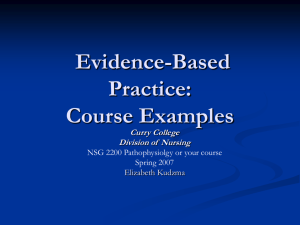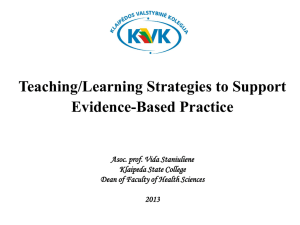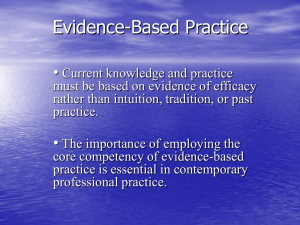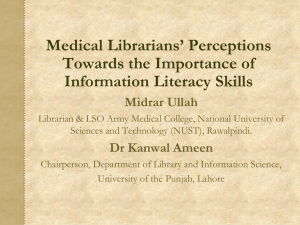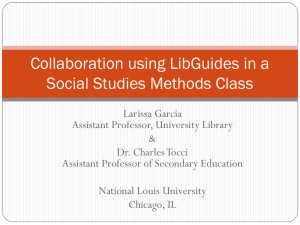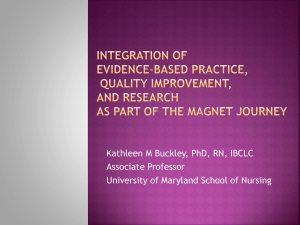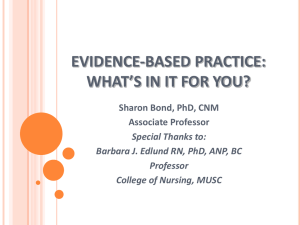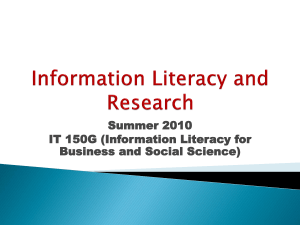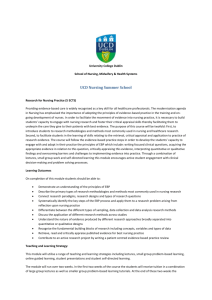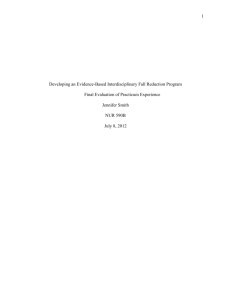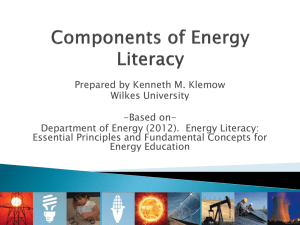Information Literacy and Nursing Students
advertisement
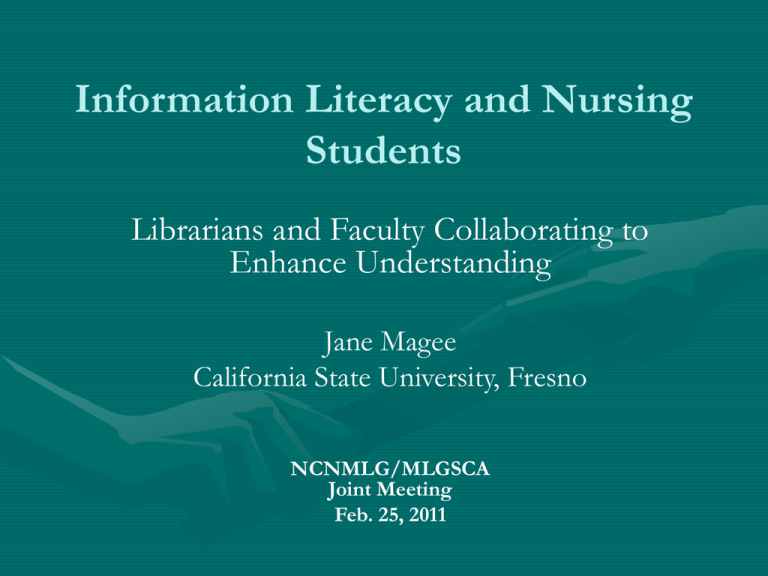
Information Literacy and Nursing Students Librarians and Faculty Collaborating to Enhance Understanding Jane Magee California State University, Fresno NCNMLG/MLGSCA Joint Meeting Feb. 25, 2011 NCNMLG/MLGSCA 2011 Joint Meeting San Francisco, CA Jane Magee Reference and Instruction Librarian Liaison to the College of Health and Human Services Henry Madden Library California State University, Fresno jmagee@csufresno.edu Information Literacy As defined by the Association of College and Research Libraries, an information literate individual is able to: • Determine the extent of information needed • Access the needed information effectively and efficiently • Evaluate information and its sources critically and incorporate selected information into one’s knowledge base • Use information effectively to accomplish a specific purpose • Understand the economic, legal, and social issues surrounding the use of information, and access and use information ethically and legally In other words, knowing when and why you need information, where to find it, and how to evaluate, use and communicate it in an ethical manner. Evidence-Based Practice in Nursing The process of locating, appraising, and applying the best evidence from nursing and medical literature to improve the quality of clinical practice. Ask: formulate an answerable question from an information need Acquire: identify articles and other evidence-based resources that answer the question Appraise: search results for validity and usefulness Apply: findings to your clinical practice and evaluate your professional performance Information Literacy Evidence-Based Practice • • • • • • • • Recognize need for info Locate it Evaluate it Use it effectively Ask Acquire Appraise Apply Information literacy is an essential component in the application of EBP. Since one of the most important aspects of evidence-based practice is critical appraisal of the evidence, information literacy is an important element in the nursing curriculum. Therefore, IL skills are prerequisite to an evidence-based approach to nursing practice, quality patient outcomes, and a confident approach to lifelong learning. ESILI -- Enhancing Student Information Literacy Initiative CSUF Provost’s Office / Instruction Librarians Teaching faculty submit proposals Financial incentive $$$$ Syllabus / assignment redesign to incorporate IL CSU IL Coordinator orientation Workshop – what they already do, what they could do Enthusiasm !!!!!! Buy in by all Collaborating with faculty • Group progress and feedback sessions • Meeting individually • Final report / revised syllabus What librarians can do • Instruction targeted at time of need • Assignment Research Calculator ios.lib.csufresno.edu/arc / • Libguides • Tutorials – existing or create new • Jing videos • BlackBoard presence • Scoring rubrics How faculty benefit • Learning where IL initiatives may best be placed for maximum effectiveness • Influencing others that IL is beneficial to students and to adopt IL outcomes in their course work • Learning with their students how to effectively use library resources • Learning how IL can enhance their own understanding • Seeing an improvement in the quality of student work So what did we come up with? • • • • • • • • Pre and post tests Library tutorials, plagiarism workshops, etc. required Annotated bibliographies Concept maps Libguides, ARC Assessment and scoring rubrics Targeted instruction BlackBoard continued….. So what did we come up with? • • • • Clarify assignment and expectations Break into smaller parts Challenge assumptions Inspire confidence Example : Annotated bibliography assignment Worksheet Template • Complete citation for article in APA style • Which databases or resources did you search? • How did you determine keywords to use in your search strategy? • How reliable do you find this information? Why? • Write an annotation for this article, evaluating the author’s major claims, the effectiveness of the argument, the reliability of the source, and any other reasons for choosing this article. Example: Pre-/post test questions with list of information sources Where would you look for : 1 A systematic review article on obesity and adolescents. 2 American Diabetes Association Nutrition Recommendations & Interventions for Diabetes 3 A study currently recruiting for Alzheimer’s treatment 4 A double blind trial for “Wrong Site Surgery” Example: Scoring rubric Other Current Projects • EBP Research Academy Summary • Where do we go from here? • Surprises • What worked, what didn’t NCNMLG/MLGSCA 2011 Joint Meeting San Francisco, CA What innovations, new services, programs and technologies are you using and/or promoting in your library? How are you coping with the stress of budget cuts, decreased staffing, additional service demands, or information overload? What keeps you sane, gives you a lift, and inspires you to set and achieve new goals? Is technology helping you connect in new ways with your patrons? How are you working smarter? Is your library going green? Are you developing any collaborations for research or funding library programs or collections? jmagee@csufresno.edu
